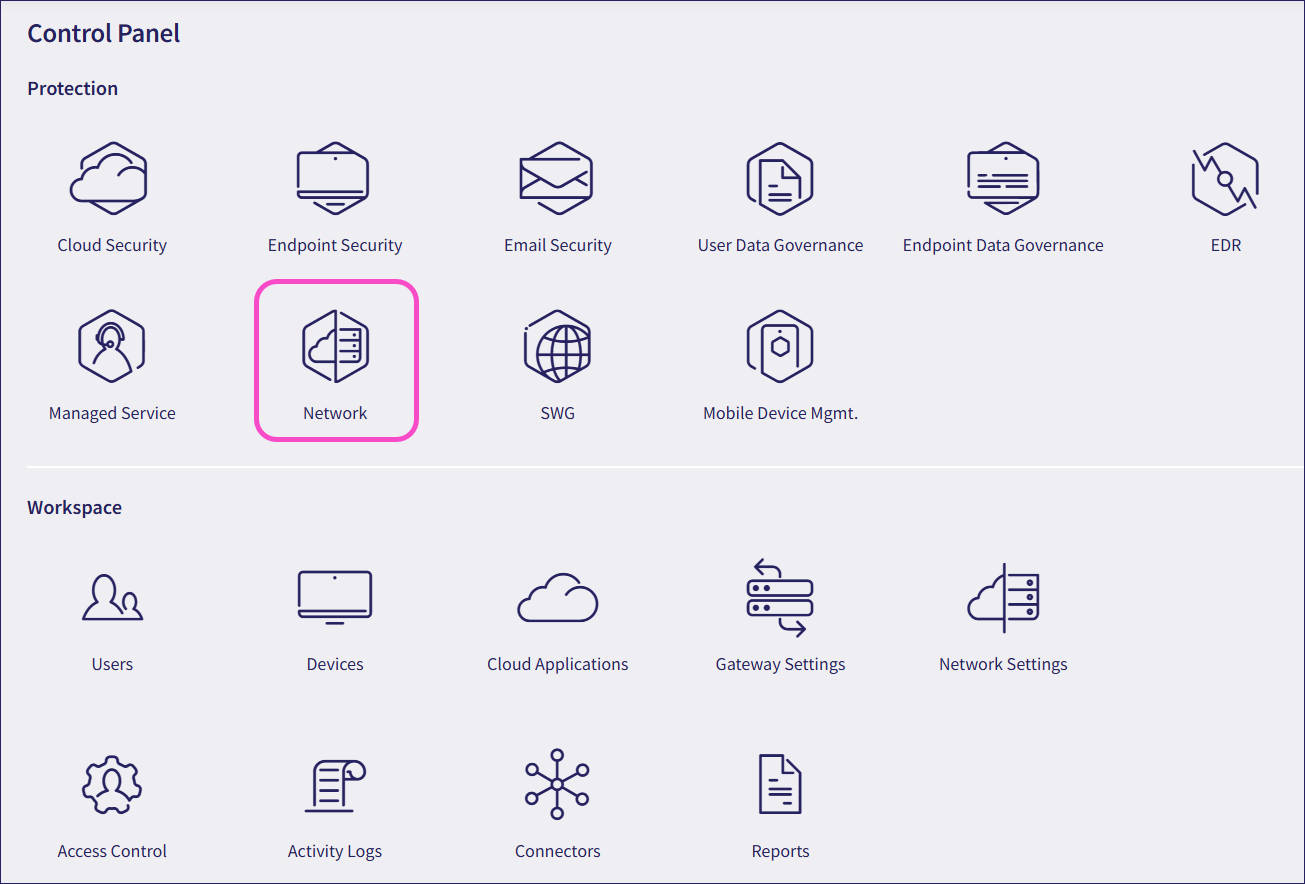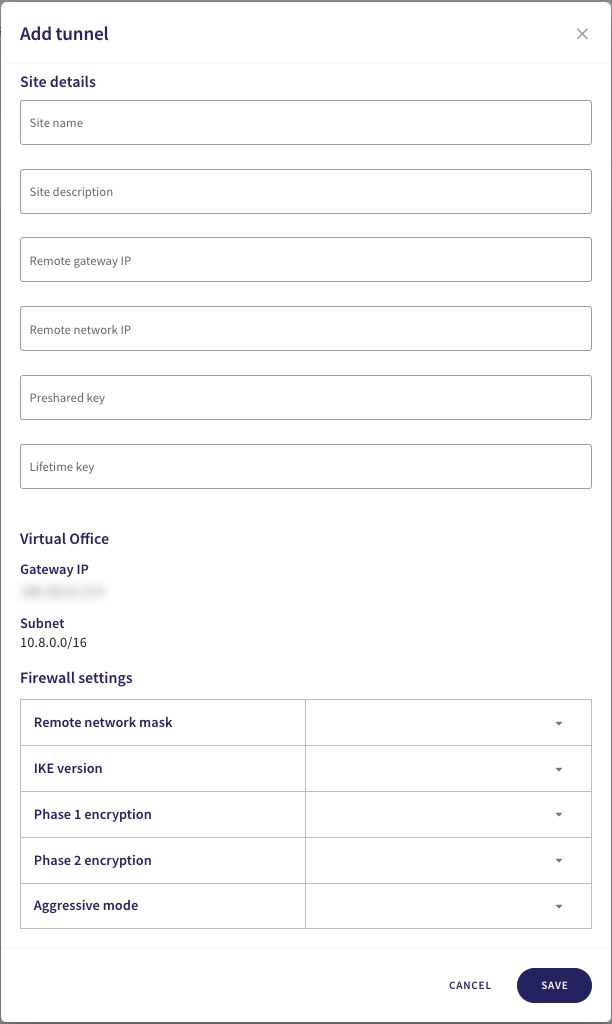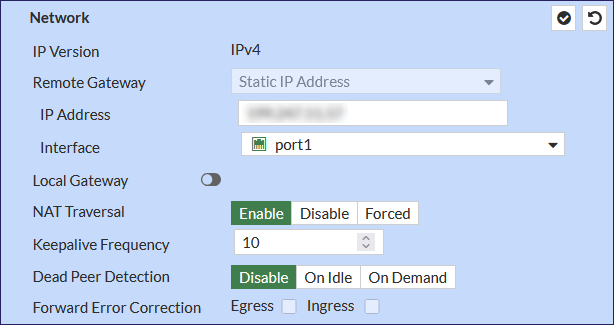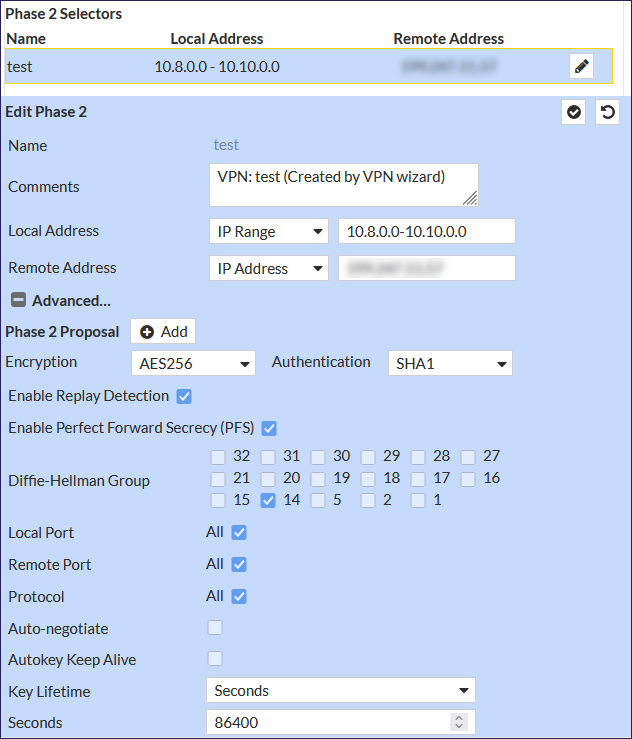As part of a virtual office, Coro includes the ability for customers to configure VPNs together with site-to-site tunnels.
This guide describes how to configure Coro to integrate with Fortinet's FortiGate firewall, and how to configure FortiGate to allow traffic for your VPN from both inside and outside the network.
Before you start, make sure you have the following:
- Access as an admin user to the Coro console for your workspace
- An active subscription (or trial) for the Coro Network module
- Access to the FortiGate admin interface. Screenshots used in this guide originate from v7.2.6.
Configure Coro with details of your site-to-site tunnel and firewall:
From the sidebar, select Control Panel.
Select Network:

Select Site-to-site tunnels:

Select + ADD to add a new site-to-site tunnel configuration.
Configure your Site details:

Avoid using special characters or spaces in your site details or preshared key.
- Site name: Enter a suitable name for your site-to-site tunnel.
- Site description: Enter a suitable short description for this tunnel.
- Remote gateway IP: Enter the firewall/router WAN IP address for the remote site.
- Remote network IP: Enter the private IP address range used at the remote site.
- Preshared key: Enter a shared password (secret) that both sites use to authenticate and secure the tunnel. Use a minimum of 20 characters, and keep a note of the key for configuration on the FortiGate device.
- Lifetime key: Enter 86400.
In the same dialog, configure the Firewall settings:
- Remote network mask: Select your local network subnet mask. For example, 16 or 24.
- IKE version: Select IKEv2.
- Phase 1 encryption: Select AES256-SHA1-D14.
- Phase 2 encryption: Select AES256-SHA1-D14.
- Aggressive mode: Select No.
To save your configuration, select SAVE.
Finally, make a note of your virtual office IP address; locate the IP address displayed at the top of the Virtual Office tab. You need this when configuring your FortiGate firewall.
Verify that your FortiGate firewall allows inbound and outbound traffic for the following Coro Network subnets:
- 10.8.0.0/16
- 10.9.0.0/16
- 10.10.0.0/16
Alternatively, configure firewall policies to permit only the specific ports and protocols used by the VPN tunnel.
Configure your FortiGate firewall to allow traffic from inside and outside the network:
Sign in to your FortiGate admin console.
Go to VPN > IPsec Tunnels.
When you create a new VPN tunnel, or edit an existing tunnel, confirm your configuration matches the following making sure to add Coro configuration values where indicated:
Configure the Network section:
IP Address: Enter your Coro virtual office IP address.
Interface: Select port1.
Leave Local Gateway disabled.
NAT Traversal: Select Enable.
Keepalive Frequency: Enter 10.
Dead Peer Detection: Select Disable.
Do not enable any Forward Error Correction options.

Configure the Authentication section:
Method: Select Pre-shared Key.
Pre-shared Key: Enter your Coro preshared key.
Version: Select 2.

The preshared key must match exactly as specified in the Coro site-to-site tunnel configuration, otherwise the tunnel cannot be established.
Configure the Phase 1 Proposal section:
Encryption: Select AES256.
Authentication: Select SHA1.
Diffie-Hellman Group: Select 14.
Key Lifetime (seconds): Enter 86400.
Leave Local ID blank.

In the XAUTH section, set Type to Disabled:

This section is available only when you create a new tunnel.
Configure the Phase 2 Selectors section:
Comments: (optional) Enter any required comments.
Local Address: Select IP Range and enter 10.8.0.0-10.10.0.0.
Remote Address: Select IP Address and enter your Coro virtual office IP address.
Encryption: Select AES256.
Authentication: Select SHA1.
Enable Enable Replay Detection.
Enable Enable Perfect Forward Secrecy (PFS).
Diffie-Hellman Group: Select 14.
Local Port: Select All.
Remote Port: Select All.
Protocol: Select All.
Leave Auto-negotiate disabled.
Leave Autokey Keep Alive disabled.
Key Lifetime: Select Seconds.
Seconds: Enter 86400.

Make sure to save your configuration.
You must configure a static route and firewall policy in your FortiGate configuration to allow Coro access to the subnet. Since each customer's LAN configuration may be unique, Coro cannot provide instructions. This guide describes establishing the site-to-site tunnel only.
After you have completed configuration of Coro Network and your FortiGate firewall, test the connection from the Coro console:
- Sign in to the Coro console.
- Go to Control Panel > Network > Site-to-site tunnels.
- Select the three-dot menu adjacent to your tunnel configuration, then select Test tunnel to trigger a synchronization test.
- Upon completion of a successful test, Coro updates the Test status field to Success.